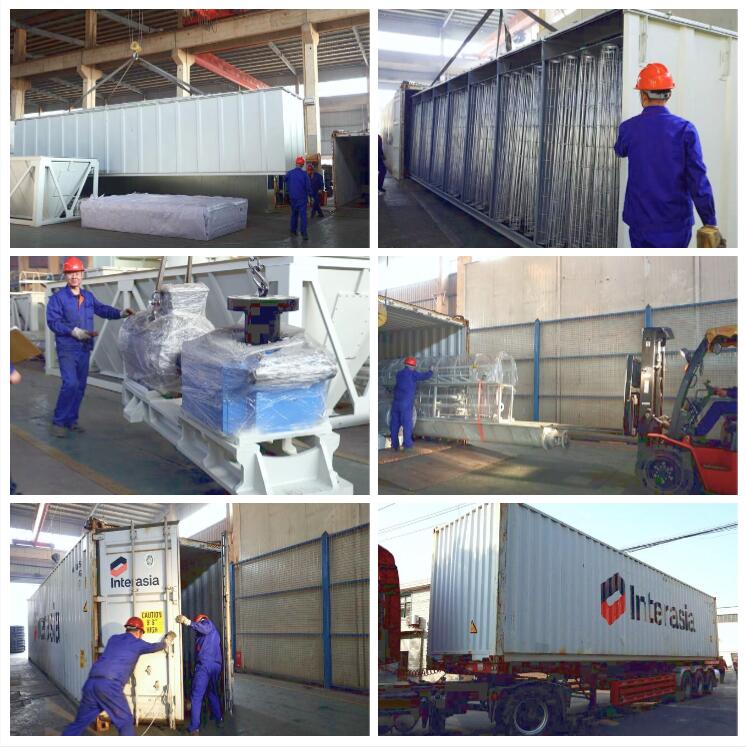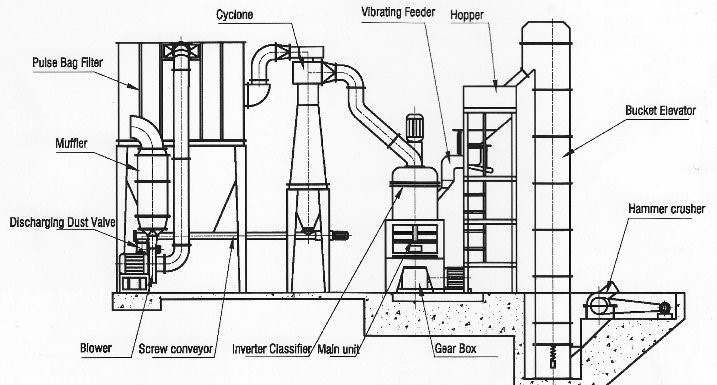For product information and pricing, Chat with sales agent:
or email us : sales@clirik.com
Click links below to see related products.

l Grinding Equipment: HGM125 ultrafine grinding mill
l Brand: CLIRIK
l Installation Location: India
l Processing Materials: Calcium carbonate, limestone, and dolomite
l Output Size: 1250 mesh
l Capacity: 3-4 tons per hour
This project will be crucial in providing a reliable solution for producing ultra-fine powders of calcium carbonate, limestone, and dolomite at a high throughput.

Model | HGM125 |
Ring Diameter(mm) | 1250 |
Ring Number (layer) | 4 |
Roller Number (piece) | 30-40 |
Main Shaft Speed(r.p.m) | 135-155 |
Input Size (mm) | ≤20 |
Output Size (mesh) | 150-2000 |
Output Size (micron) | 6-100 |
Capacity (t/h) | 2.5-20 |
Outlet Size L*W*H (mm) | 27.3*4.2*9.9 |
Main motor power (kw) | 185 |
The HGM series ultrafine grinding mills are a group of high-efficiency, energy-saving grinding machines developed by CLIRIK. These mills are designed for the production of ultra-fine powders with high fineness and precision, making them ideal for industries like mineral processing, chemicals, and pharmaceuticals.
The HGM series includes several models, such as HGM80, HGM100, HGM125, HGM1680, and others, each with varying capacities and capabilities to meet different production needs.
The HGM series is known for its ability to produce powders with a fineness range from 150 mesh to 2500 mesh.
It uses multiple grinding stages, where the material is repeatedly crushed and ground until the desired particle size is achieved.
The grinding process can produce powders as fine as 2 microns, depending on the model and material.
The mills utilize a high-speed rotating roller system and a stationary grinding ring to efficiently grind materials.
The rollers press the material against the grinding ring, and the material is ground by the high-speed movement, creating very fine particles.
Airflow classification ensures precise control over the final particle size, allowing operators to achieve the desired level of fineness.
HGM mills are known for their low energy consumption, thanks to their efficient grinding design.
The use of advanced technology and optimally designed grinding systems helps minimize the amount of energy needed for fine grinding, making them cost-effective over time.
The output fineness of the HGM series mills can be easily adjusted by changing the speed of the classifier (air separator) or adjusting other parameters, depending on the material being processed.
The mills are typically equipped with variable speed control for both grinding rollers and classifiers, allowing precise control over the size and quality of the product.
The HGM mills are suitable for processing a variety of materials, including:
Calcium carbonate
Limestone
Dolomite
Talc
Gypsum
Marble
Barite
Feldspar
And many other non-metallic minerals.
These mills can handle both hard and soft materials, making them versatile for different industries.
HGM mills are designed with closed-circuit air systems to reduce dust pollution during grinding.
The built-in pulse jet dust collectors and cyclone separators capture and remove fine particles from the air, ensuring a cleaner environment.
The mills comply with modern environmental standards for dust control, noise reduction, and overall emissions.
These mills are engineered for stable and continuous operation, even at high capacities.
The components are designed to withstand long-term use, minimizing the need for frequent maintenance and downtime.
The HGM series has been designed with simplicity in mind, making maintenance relatively easy.
The system is equipped with wear-resistant components, reducing the frequency of part replacement.
The HGM series includes various models designed for different production capacities:
HGM80: A smaller mill suitable for laboratory and small-scale production (0.2-1.5 tons/hour).
HGM100: Slightly larger, designed for medium-scale production (1-3 tons/hour).
HGM125: A popular model for medium to large-scale production (3-4 tons/hour).
HGM1680: A larger mill used for high-capacity operations (5-8 tons/hour).
The structure of the HGM series typically includes the following components:

Main Unit (Grinding Chamber)
The main grinding unit consists of a rotating shaft, grinding rollers, and a grinding ring. The rollers are responsible for grinding the material against the ring, where the material is finely crushed.
The material is continuously ground as it passes through multiple grinding stages until it reaches the desired fineness.
Classifying System (Airflow Classifier)
The airflow classifier is a key component of the HGM mills. It separates fine particles from coarse particles based on their size and ensures that only the desired particle size is discharged.
The classifier's speed can be adjusted to fine-tune the fineness of the final product.
Cyclone Separator
The cyclone separator helps collect fine particles and prevent them from being lost in the airflow.
The coarse particles are returned to the grinding chamber for further grinding, while the fine powder is moved to the collection system.
Air Blower (Fan)
An air blower generates the airflow necessary to carry the ground material to the classifier and then to the collection system.
It ensures that the ground material is separated, and the fine particles are filtered out effectively.
Dust Collection System
Pulse jet dust collectors or bag filters are used to capture fine dust particles generated during the grinding process.
These collectors ensure that the plant operates in an environmentally friendly manner and helps keep the working area clean.
PLC Control System
The PLC control panel is used to operate and monitor the entire grinding process.
It enables operators to adjust settings such as feed rates, grinding speed, airflow, and classifier speed, ensuring the plant operates efficiently.
Vibrating Feeder or Belt Conveyor
The material is fed into the grinding chamber through a vibrating feeder or a belt conveyor, ensuring a uniform and controlled feed rate.
CLIRIK Machinery is a leading manufacturer and supplier of advanced mineral processing equipment, specializing in ultrafine grinding mills, vertical mills, raymond mills, hammer crushers, and other machinery used in the powder processing industry.
With a strong reputation in the global market, CLIRIK is known for providing high-performance, energy-efficient, and environmentally-friendly machines that cater to various industries, including mineral processing, chemical, pharmaceutical, food, and non-metallic minerals.
